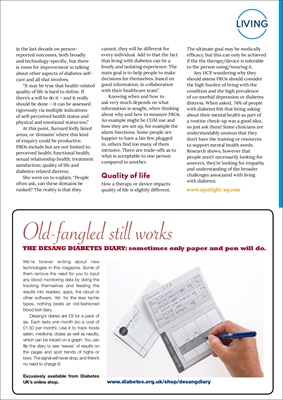
25
LIVING
Old-fangled still works
We're forever writing about new
technologies in this magazine. Some of
them remove the need for you to input
any blood monitoring data by doing the
tracking themselves and feeding the
results into readers, apps, the cloud or
other software. Yet, for the less techie
types, nothing beats an old-fashioned
blood test diary.
Desang's diaries are £9 for a pack of
six. Each lasts one month (so a cost of
£1.50 per month). Use it to track foods
eaten, medicine, doses as well as results,
which can be traced on a graph. You can
flip the diary to see 'waves' of results on
the pages and spot trends of highs or
lows. The signal will never drop, and there's
no need to charge it!
Excusively available from Diabetes
UK's online shop.
THE DESANG DIABETES DIARY: sometimes only paper and pen will do.
www.diabetes.org.uk/shop/desangdiary
in the last decade on personreported
outcomes, both broadly
and technology-specific, but there
is room for improvement in talking
about other aspects of diabetes selfcare
and all that involves.
"It may be true that health-related
quality of life is hard to define. If
there's a will to do it - and it really
should be done - it can be assessed
rigorously via multiple indications
of self-perceived health status and
physical and emotional status too."
At this point, Barnard Kelly listed
areas, or 'domains' where this kind
of enquiry could be productive.
PROs include but are not limited to:
perceived health; functional health;
sexual relationship health; treatment
satisfaction; quality of life and
diabetes-related distress.
She went on to explain, "People
often ask, can these domains be
ranked? The reality is that they
cannot, they will be different for
every individual. Add to that the fact
that living with diabetes can be a
lonely and isolating experience. The
main goal is to help people to make
decisions for themselves, based on
good information, in collaboration
with their healthcare team".
Knowing when and how to
ask very much depends on what
information is sought, when thinking
about why and how to measure PROs.
An example might be CGM use and
how they are set up, for example the
alarm functions. Some people are
happier to have a fair few plugged
in, others find too many of them
intrusive. There are trade-offs as to
what is acceptable to one person
compared to another.
Quality of life
How a therapy or device impacts
quality of life is slightly different.
The ultimate goal may be medically
efficacy, but this can only be achieved
if the the therapy/device is tolerable
to the person using/wearing it.
Any HCP wondering why they
should assess PROs should consider
the high burden of living with the
condition and the high prevalence
of co-morbid depression or diabetes
distress. When asked, 74% of people
with diabetes felt that being asking
about their mental health as part of
a routine check-up was a good idea,
so just ask them! Some clinicians are
understandably anxious that they
don't have the training or resources
to support mental health needs.
Research shows, however that
people aren't necessarily looking for
answers, they're looking for empathy
and understanding of the broader
challenges associated with living
with diabetes.